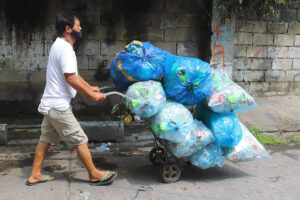PLASTIC ODYSSEY, a French nongovernment organization, is seeking to tap local partners to expand its plastic recycling micro-factories in the Philippines.
“We are working on the reduction and alternatives to plastic. The plan is to really partner with local entrepreneurs and create local jobs,” Plastic Odyssey Co-founder and Chief Executive Officer Simon Bernard told BusinessWorld.
“The best way to do it is to turn this problem into opportunity. So, we will try to find a way to make a valuable business model out of it so that we can create jobs,” he added.
Mr. Bernard said that the group is also seeking partnerships with financing institutions to invest in the micro factories.
“The challenge is to find local operators, local directors for the factories. So that’s why we are thinking about building schools and academies to train and create these new jobs from the people who will operate the factory to people who will run the business,” he added.
Plastic Odyssey, in partnership with Delfingen, has created “low-tech” plastic recycling micro-factories designed to fit inside shipping containers.
The recycling machines have a typical capacity of 100 to 300 metric tons of plastic waste annually and costs about 60,000 to 100,000 euros.
“The plan is to have hundreds, maybe thousands of them that will work together to shred the plastic and then melt it and turn it into new material,” Mr. Bernard said.
“The idea is really to turn waste directly into product and so (we) are finding local markets to make transport pallets, furniture, or building materials for example, so that the waste can have a price,” he added.
Plastic Odyssey is conducting a three-year survey of 30 countries to establish initiatives to combat plastic pollution. It is set to stop over in Cebu next month.
“We want to help recycle the plastic that has been produced so far and that will continue to be produced… We see today that there is a huge amount of plastic that has been produced so far. Worldwide, it’s about five billion tons of plastic that has not been recycled,” Mr. Bernard said.
The Philippines produces about 2.7 million metric tons of plastic waste per year, with an estimated 20% ending up in the ocean, according to the World Bank. — Adrian H. Halili

